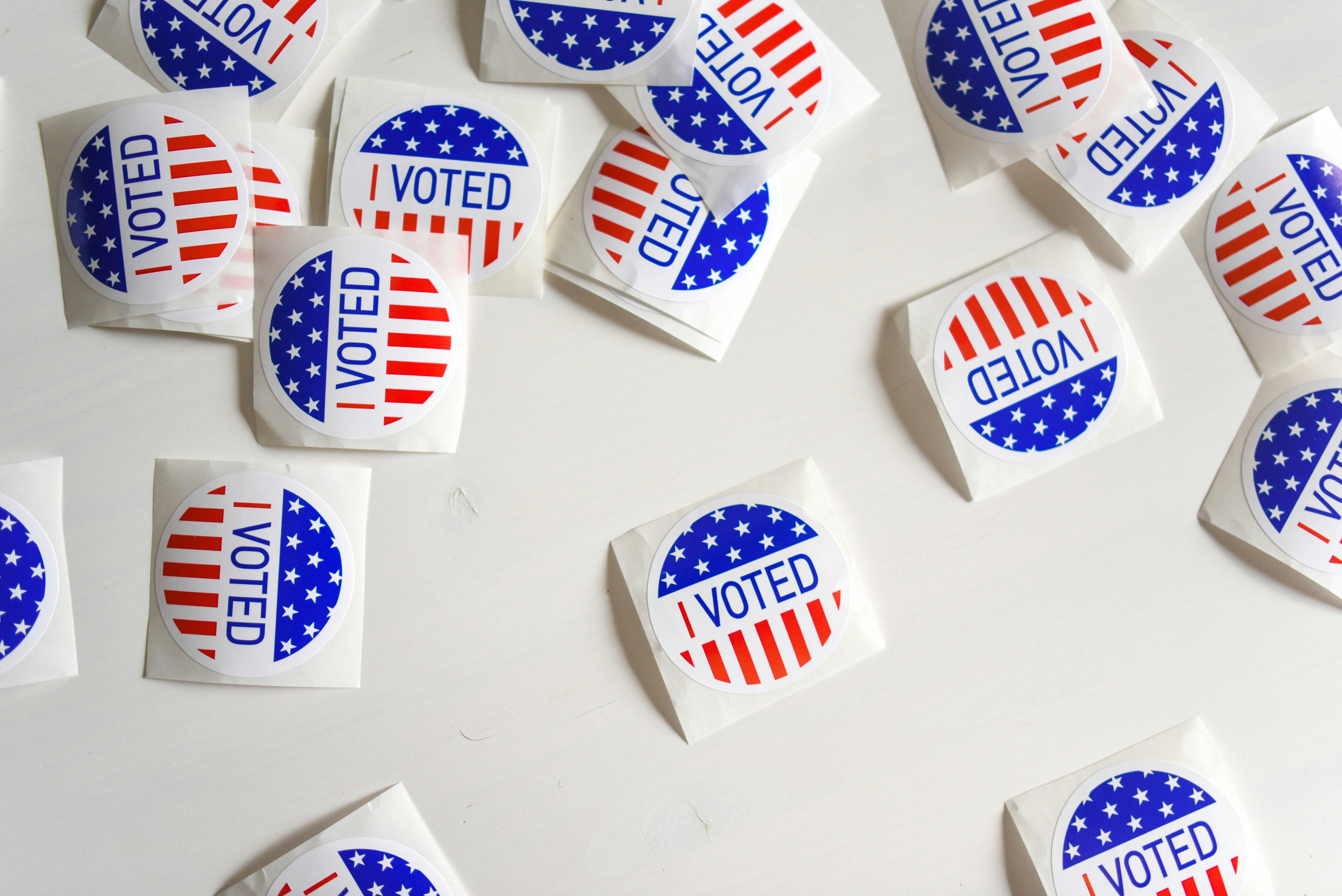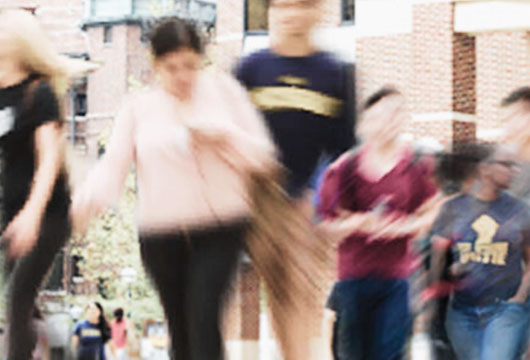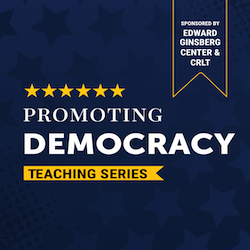
CRLT and the Edward Ginsberg Center are partnering to offer programming and resources for instructors teaching during the 2024 election through the Promoting Democracy Teaching Series. As part of this collaboration, we are refreshing our guidance from recent presidential elections. While many of the strategies in our earlier entries remain as best practices, this updated piece also reflects our ongoing efforts on the topic, adapted for the current political environment.
The 2024 Presidential Election is fast approaching, and students and faculty alike will be highly impacted by both election rhetoric and election outcomes. On university campuses, protests and speech around the war in Gaza have added more tension to an already fraught election. Important dialogues around issues like climate change, women’s rights, immigration, and the economy can cultivate a civic-minded society, but they also make election seasons complex and challenging times for teaching. Nevertheless, U-M's mission to "develop leaders and citizens who will challenge the present and enrich the future" reminds us of the incredible opportunity instructors have to harness the momentum of each election season for student learning and democratic engagement.
For these reasons, we encourage all instructors to be prepared by proactively thinking about how the 2024 Election may impact their students, their classrooms, and themselves. While U-M instructors and staff cannot advocate for candidates or ballot initiatives, they can encourage student voting and engagement with election issues (see these guidelines and FAQs from U-M’s General Counsel).
Below, we offer reflective questions and nonpartisan resources designed to help instructors and staff think about opportunities to promote democratic and civic engagement in their courses, while considering and preparing for the high stakes of election-related discussions for their students and themselves.
As always, CRLT and the Ginsberg Center consultants are available to talk with any instructor about planning courses or class sessions -- or responding to difficult moments if they arise. You can make an appointment through CRLT’s website or use the Ginsberg Center’s Support Request Form.
How can I connect my course or discipline to the election and issues raised by it?
We encourage instructors to start with course and disciplinary connections to the election because it supports students and instructors in a number of ways including:
Promoting Student Voting: Students are more likely to vote when they feel confident they have the knowledge and skills to critically evaluate the platforms of candidates. In fact, research suggests that universities with the highest levels of student political participation prioritize regular classroom discussions about policy, current events, and political issues across the disciplines (Thomas and Brower, 2017). Whether the topic is health care, systemic racial inequities, education, immigration and the rights of refugees, fracking or climate change, gender inequality and LGBTQ+ rights, or international relations—every discipline provides opportunities for students to practice skills they need to weigh the issues raised by the election.
Facilitating Constructive Dialogue: In these Guidelines for Discussing Difficult or High-Stakes Topics, we recommend that instructors start by identifying a clear purpose for the election-related discussion or activity, tied to your course topics and goals. This step, along with providing lots of structure and careful facilitation, gives students space to process what’s happening in the world, while establishing parameters or bounds around the conversation. This can help students move through disagreement and emotion.
Anchoring in Academic Expertise: Instructors also benefit from this approach to discussing elections. By centering election discussions in their disciplinary knowledge and epistemologies, instructors can guide conversations with greater confidence and share insights from their expertise.
In our Identifying and Strengthening Course Connections reflection, you will find questions and helpful resources for identifying intersections between the election (and issues raised by the election) and your course or discipline. You will also find a set of follow-up reflection questions on strengthening and clarifying the link to your course learning objectives for you and—importantly—your students. On the Strategies to Support Civic & Democratic Engagement in Courses page, you can also find a rich set of reflection questions to identify course and disciplinary connections.
Take the opportunity to explore strategies for connecting your course(s) to the election and the issues, engage with cross-disciplinary examples, and generate ideas for your own teaching at the Connecting Your Course to the 2024 Election workshop (Sept. 26) in the Promoting Democracy Teaching Series. Open to U-M faculty, graduate students, and post-docs.
How might my courses allow students to practice some of the fundamental skills required by democracy?
In CRLT’s regular programming around course design and lesson planning, we always encourage instructors to start with their student learning goals. When it comes to democratic and civic engagement, our advice is quite similar. When an instructor homes in on their specific goals for integrating election topics into a course or class session, these goals can guide their decision making and provide a clear target of success. In this handout –Your ‘Why’ for Election, Civic, & Democratic Engagement– you can explore a comprehensive set of specific goals for discussing the election and issues raised by the election, organized into three categories. We’d like to delve a little deeper into the last category: goals that support students’ long-term civic engagement.
Particularly amidst powerful public examples of vitriol, classroom communities can help students practice informed and responsible participation in dialogue with people whose ideas and viewpoints differ from their own. Regardless of your course topic, you can help your students begin to practice habits of mind that allow them to engage critically and learn from unfamiliar perspectives--habits that are important for their participation in democracy.
In addition to the content of our individual disciplines and courses, there are overarching democratic skills that students can develop in courses across the University. These include:
- The ability to engage in respectful discourse and thoughtful argumentation
- The capacity to speak and listen in ways that promote collective learning and advance social good
- The ability to evaluate bias, evidence, and misinformation in text, discourse, and other mediums
You don’t need to start from scratch or redesign your course to support this skill building. You can explore ideas for civic learning and democratic engagement, organized by how much time you have to dedicate in class. Step-by-step civic learning activity guides are ready to be adapted and implemented into your teaching context. Using the versatile Deliberative Dialogue framework and prompts, students have a structure to explore differing positions on important issues. The prompts and curated artworks in the Dialogue Deck can foster conversation and reflection on political and social norms in the US, while also providing an opportunity for students to examine their own beliefs and values and explore their origins.
Lastly, partners across campus have created exciting opportunities for students to develop and practice skills for civic engagement. You can share these opportunities with your students, encourage them to participate, or incorporate them into your course plan.
Civic Engagement Opportunities on Campus
- Dinners for Democracy organized by Turn up Turnout
- Intergenerational Voting Dialogues sponsored by the Michigan Community Scholars Program and Ginsberg Center.
- The “Hey, We Need to Talk” Exhibit and its Common Sense Diner at UMMA
- Cinematic Democracy: Films Screenings for Civic Engagement hosted by the U-M Library.
How can I prepare for the high-stakes conditions that come with teaching during an election season?
The high stakes of the 2024 Election are deeply felt by both students and instructors. Moreover, the outcomes of the election will impact us differently, depending our identities and positionality. Even before election day, students and instructors whose identities are repeatedly targeted or negatively represented can feel unsafe, unwelcome, and drained emotionally and intellectually by election rhetoric. This can emerge in classroom discussions and activities about the election as well. As we prepare to teach in this moment, consider what is at risk for students during a classroom conversation about the election. For example:
- Students may perceive that there will be academic consequences for sharing their perspectives.
- Students may feel vulnerable as the discussions surface their deeply held beliefs, political positions, and personal experiences.
- Students’ relationships with each other and their instructors can be impacted by difficult discussions.
- Students’ sense of belonging in the classroom, discipline, and at U-M can be eroded when their perspectives are not recognized or when sweeping or incorrect statements are made about communities to which they belong.
Of course, we have also highlighted some of the valuable benefits to these classroom experiences if facilitated well: they may build students’ motivation and confidence as voters; contribute to course learning; build skills that are crucial to a democracy and civic life; and provide a space to process what’s happening in the world.
With the stakes and potential benefits in mind, we encourage instructors to lay the groundwork now for classroom discussions on election topics. This may include establishing and regularly highlighting discussion guidelines for your course, which foster a respectful community and set-up ground rules for productive discussions. It also includes using structured activities for discussions, rather than a more open or informal approach. Another way to prepare is to review and keep on-hand a list of open-ended discussion questions to support your facilitation of high-stakes discussions.
To learn more about these strategies within a framework for designing high stakes discussions, join us at a Framing & Facilitating High Stakes Discussions: Election Edition workshop on Sept. 17 or Oct. 21 in the Promoting Democracy Teaching Series. Open to U-M faculty, graduate students, and post-docs.
In this political moment, discussions and instruction related to the Middle East and the War in Gaza can be particularly high stakes for many of our students. Hear from panels of experienced U-M instructors on this topic at the Addressing Antisemitism in Teaching session (Sept. 25) and Addressing Anti-Palestinian, Anti-Arab, & Anti-Muslim Racism in Teaching session (Oct. 10) of the CRLT Seminar Series. Open to U-M faculty, graduate students, and post-docs.
Even when we design discussions and activities related to election issues in advance, there is always the possibility of unexpected eruptions of tension, conflict, or big emotion. Even though these hot moments may occur unexpectedly, we can still prepare for the possibility by strengthening our facilitation skills and by practicing language to use in these moments.
Set aside time to start this work in community with other instructors at a Making the Most of 'Hot Moments': Election Edition workshop on Sept. 20 or Nov. 8. Open to U-M faculty, graduate students, and post-docs.
How can I support student voting?
Studies show that encouragement from faculty, staff, and other students makes a significant difference to student registration and turnout (Bennion & Nickerson, 2016; DellaVigna, List, Malmendier & Rao, 2016; Gerber & Rogers, 2009). There are simple, quick ways you can support student voting, including:
- Share the UMICH Vote link–govote.umich.edu–in your syllabus and refer students to UMICH Votes as U-M’s trusted resource for voting, voter registration, and election information.
- Share up-to-date information about voting using the Ginsberg Center's pre-designed voting announcements slide deck for classrooms, based on UMICH Votes' system of messaging.
- Share vote411.org or BallotReady links in your syllabus–they give a nonpartisan overview of all upcoming elections and what's on the ballot nationwide
- Discuss your own voting plan about when and where you will vote, and encourage students to make their own.
Turn Up Turnout (TUT), a nonpartisan student organization sponsored by the Ginsberg Center, is a reliable source for voting information at U-M with a strong commitment to getting out the student vote. You can support student voting by sharing their work this fall:
- Highlight TUT’s voter registration tables on campus.
- Invite them to share voting information in your class.
- Show your students this 7-minute 2024 voting information video, created by TUT to share information like: who can vote, how old you need to be to register, what address you can register from, registering in Michigan if you are from out of state, when you can vote in person and by mail, what ID and documentation you need to vote, and more!
- Coordinate a Walk to the Polls for your unit or department, or share this opportunity with students for their student organizations.
U-M is fortunate to have two campus voting hubs where students can pose their questions to trained peer mentors, explore nonpartisan voting resources, and take advantage of a pop-up office of the Ann Arbor City Clerk for registration and voting in the City of Ann Arbor. Bring your class to explore the resources and installations—and even make a button!— at the UMMA Campus Voting Hub or the Duderstadt Center Gallery Campus Voting Hub.
- Log in to post comments
- 2298 views






